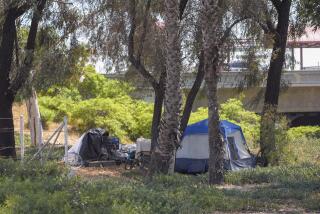Homelessness in the Valley / Surviving Day by Day : Survival Instincts : Jobless Man Gets by on Brains, Bravado, Efficiency
- Share via
VAN NUYS — Steve Coughlin reaches for a folded dollar bill sticking through the crack of a Mazda window and bows almost imperceptibly.
“Thank you,” he says, but the woman behind the wheel isn’t looking at him.
The light turns green and cars sealed against the late afternoon heat file past the 46-year-old former heavy equipment operator and the sign describing his predicament: No Job, No Home, No Food.
It’s 5:30 p.m., and Coughlin will spend three more hours this day at the Sherman Way off-ramp of the San Diego Freeway. He is hoping for $35 to $40 from passing motorists, enough for a night at a motel on Sepulveda Boulevard, plus food.
So far he has received $4, and it looks as though he will spend another night “camping” in the bushes next to the freeway.
“No big deal,” Coughlin says. “I’ll survive. I always do.”
Coughlin describes his ability to get by with a certain bravado. He needs little besides an old sleeping bag because he is efficient. He can handle the dangers of living on the street because he is smart.
With a few tough words, he says, he scatters teen-agers who threaten to rob him. And cops are no problem.
“Sometimes they give me a ticket for panhandling,” he says, tearing up an imaginary one. “They’d be better off arresting me. Then I’d have a place to stay and some food.”
Coughlin was raised in Sylmar. He dropped out of Sylmar High School as a freshman, got a construction job and trained to work heavy equipment. During the 1970s development boom, he earned enough to buy a home in the Wrightwood mountains, where he lived with his wife, two sons and a daughter.
But then everything fell apart. His wife died 10 years ago, and his children--now in their late 20s--moved out of state. Jobs became scarce. Coughlin sold his home and lived off the equity and unemployment benefits until both ran out three years ago.
Since then, Coughlin has found only day jobs, doing construction or yard work. He stayed in a homeless shelter once, but someone stole his tennis shoes. He never returned.
Coughlin has rejected his children’s offers of help. He has his own life, he says airily, with its own routine.
He gets clothes from the Church on the Way in Van Nuys and washes them at a coin laundry on Sepulveda Boulevard. He eats at Fosters Freeze at Sepulveda and Sherman, or Denny’s. He uses the bathroom at Shell or Mobil.
To the casual observer, Coughlin might seem satisfied with his life. But that, experts say, is part of the problem.
“Everyone tries to put a positive spin on their life,” says Paul Koegel, a behavioral scientist with the RAND Corp. “In situations like this, though, it can give lie to the common idea that homeless people choose homelessness. That’s a disturbing concept, but it’s attractive to people who don’t want to come up with solutions to the problem.”
Coughlin watches meditatively as traffic flows past. He never speaks to motorists unless they give money, he says, and then he is simply polite. It helps keep his dignity intact.
But even Coughlin’s pride has limits. His life, he admits, has not turned out the way he would have hoped.
“This is a messed-up way to live,” he says. “I wouldn’t wish it on my worst enemy.”
More to Read
Sign up for Essential California
The most important California stories and recommendations in your inbox every morning.
You may occasionally receive promotional content from the Los Angeles Times.






